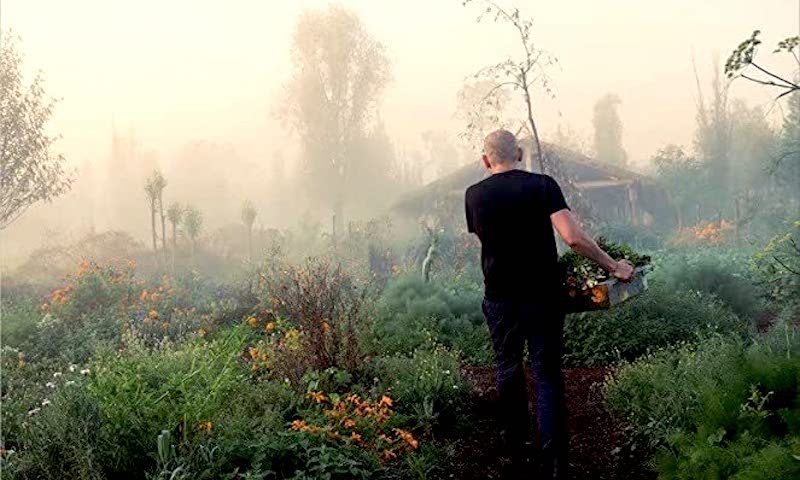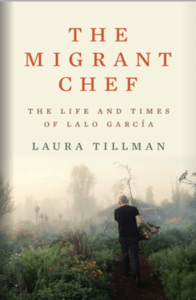From a Rural Mexican Village to Creating Haute Cuisine in the Big City

One morning in October of 2016, a young woman walked to the corner of Tonalá and Zacatecas in Mexico City, toward a restaurant with a simple black awning. Its white lettering read, Máximo Bistrot Local. She had been enrolled in a vocational cooking program and had come to Máximo in search of a job.
If successful, she would join millions of local service workers who undertake hours-long commutes daily: the walk to a street corner and the wait for a dingy van, the crouched shuffle inside the door to sardine next to passengers smelling of their morning coffee and spritz of perfume, or the sweat and Fabuloso still clinging to the uniform from yesterday’s shift.
When they are dropped at a metro stop, the descent past tamal vendors into the tunnels carved through the muddy foundation of this ancient metropolis, its canals once pulsing with lake water, now drained. The Valley of Mexico is ringed by snow-capped mountains, volcanos that trap pollution and seem to volley the sounds of 22 million inhabitants—the clang of the garbage collector’s bell and the barking dog, the operatic call of “el gaaaaasssss,” the prerecorded vendor hawking avocados and guavas.
Finally, up, up, up from the metro and into the streets of the well-to-do neighborhood of the Colonia Roma, with its turn-of-the-century mansions converted into cafés and apartments, its tidy parks with fountains and purebred dogs fetching for their masters.
On this day, the young woman walked through the doorway toward the marble counter where Chef Eduardo García Guzmán, known to most everyone here as Lalo, prepared the day’s menu, which changed with the seasons and his whims. Though the men in his family were blessed with thick manes that lasted into old age, five years of running the restaurant had pilfered the hairs from the top of his head.
At first glance, he didn’t look the part of a famous restaurant owner: his shirt was usually stained, and he could often be found performing the most menial tasks in the kitchen, like sorting through mushrooms or scaling fish. But authority radiated from his eyes, framed by arched brows; the rest of the staff shifted around him, a school of minnows darting back from a larger specimen. Those eyes were always asking questions, protecting against hidden motives, searching for signs of true passion.
Lalo walked out from behind the counter, wiped his hands on a rag, and led the job applicant to the best table in the restaurant, a disc of dark tropical hardwood in a cozy alcove facing an open doorway, crowded with olive trees in terra-cotta pots. She had been enrolled in Gastromotiva, a foundation that helps Mexico’s economically vulnerable to get the training they need to obtain well-paying kitchen jobs. Lalo fundraised for the program and welcomed its participants for job interviews like this one.
The first thing she needed to do, he said, was come in for a test shift.
“We want you to see how we work—because it’s tough,” he told her, his body relaxed, his gaze intent. “The profession you’ve chosen is one of the most difficult, but once you embrace it and you overcome the initial barrier, it’s one of the best in the world.”
He asked where she lived—not to gossip, he assured her, but because she’d be working 12-hour days, and he knew the commute could turn that into 15 or 16. He’d try to accommodate her if he could.
He said, “I’m not going to sell you the clouds because that’s not how this business works.”“The fact is, where you live, there aren’t restaurants where you can work, because on the one hand they can’t pay you well, and, on the other, you can’t learn from the people that work there. So, you made a good decision by coming here. But then again, maybe not. Maybe it’s too far away. That’s life, that’s the reality.”
If she didn’t take the time to learn now, her career would flatline, he warned.
“Listen, I’m more sincere than the rest,” he said. “I’m not going to sell you the clouds because that’s not how this business works. If you learn the business, you can achieve something incredible, but first you need to commit totally. First, you’ll have to give it your best try.”
Gracias, she said. Lalo called over his assistant to help her schedule a date for a trial shift; normally she’d begin at 6 a.m., but she could come in at 7 if she needed to. Then he went back to work, unsure if his candid talk about the grueling nature of the business would ultimately intimidate or inspire. She never came back. As with so many others, Lalo never bothered to learn her name.
People sought Lalo out constantly. From the dairy farmer who came to the city to convince Lalo to put his queso fresco on the menu, to the preening millennial millionaire eager to add him to his circle of friends, they walked through the door day after day. Lalo was now one of the most famous chefs in Mexico, his flagship restaurant a destination for tourists from around the world, named one of the fifty best in Latin America, the best in Mexico. He’d developed a reputation as a man who would hear you out and try to help—if the request had merit.
He wasn’t the country’s most famous or influential chef—that title belonged to his mentor, Enrique Olvera, of the restaurant Pujol—but he was the one people came to as a confidant, the one you didn’t need an appointment to see. A stranger might walk into the restaurant, and, if the cause was worthy, Lalo would do more than give them the shirt off his back. He’d open his closet and give away every shirt he owned. But if he didn’t approve, he’d nod noncommittally, say the idea was “amazing,” and never return their calls.
Among his employees in the crowded galley kitchen, he could be a cook’s best ally; in his mind, this also meant being their harshest critic. Without his high standards, how could he propel these young hopefuls, how could he help them turn another service industry job into a career—and an opportunity to ascend into the country’s fragile middle class? Lalo could hold out his hand and pull people out of poverty if they were willing to put in the work, but he was frustrated daily, disillusioned by lack of commitment, worried that every time he stepped away, the train would run off the track.
In his waking life, when he made that trip, he couldn’t stand himself: a rich man driving into a poor town that barely knew him.Enrique Olvera was known for his innovative spirit: he could deconstruct and reconstruct traditional concepts, creating something that bore his distinct signature, starting trends that trickled through mid-market eateries and into home kitchens, spreading ideas that drew people close to an unfamiliar culture. Lalo had traveled tens of thousands of miles to eat at such restaurants, like the outpost at the end of a Scandinavian road, course after course composed of moss and foraged herbs and cured reindeer. Food that required thousands of dollars for planes and taxis and hotel rooms before you even got the check. This food interested him, sure.
Lalo had happily taken those journeys, and had found inspiration at the end of the rainbow. But he couldn’t seem to entirely suspend his conscience, to enjoy without being reminded of the nauseating math of excess and famine. “There are people who can’t even get a clean glass of water, it’s fucked up. How do you wrap your mind around it? You don’t. If you do, you just become miserable.” Lalo had no desire to craft forms of privilege so esoteric that most people were unaware they even existed.
Sometimes, he daydreamed about a future when the world economy would crash, the tourists would stop coming, and he could close his restaurants and go back to the village where he was born. He’d build a house with his hands. He’d raise cows and pigs and make his own cheese and charcuterie. He’d sleep under the stars and wake up with the sun.
Then there were days when he could envision the contours of an empire: a dozen restaurants, providing a livelihood for a thousand people. A presidency where he’d make his first act the construction of an enormous prison where he could lock up the narcos and politicians who were ruining his country.
As he cooked, Lalo talked to his staff and his wife about what he’d seen on the news and what ought to be done about it. But when people praised him for the jobs he created or his environmental work, he grew stoic, the expression drained from his face, and he said things like, “I’m just a simple cook who feeds people who are hungry.”
Lalo had worked for success—at times defined simply as survival—since he was a lanky ten-year-old, picking oranges and digging onions on the route from Florida to Michigan.
Now, the small bistro he had opened with his wife, Gaby, had blossomed into three restaurants they owned and several others they advised. Máximo Bistrot had become a meeting point for the wealthy and powerful; when he shook hands with well-heeled businessmen and long-limbed tourists, he was there but not there, stealing distracted moments to return to the oasis of his village, an idealized version that consisted of woodsmoke and starlight. But in his waking life, when he made that trip, he couldn’t stand himself: a rich man driving into a poor town that barely knew him.
The choices and demands he made each day masked deep-seated anxieties. Yes, this was assuredly the right sauce for this entrée, the wrong chef de partie for this job. But were the people who surrounded him compadres, or a series of well-disguised parasites, gently draining his blood as they smiled? Was this life of “hospitality,” where money and kind gestures commingled to vertiginous effect, leading him astray?
When Lalo declared himself a “simple cook who feeds people who are hungry,” he knew that, in fact, his interior and exterior life increasingly had grown complex. That the people who came to his restaurants expected an experience that transcended hunger. That the closer he got to the next goalpost, the further a pat ideal like “happiness” or “success” retreated from view. In its pursuit, what would he finally gain? What would he lose that couldn’t be bought back?
__________________________________

Excerpted from The Migrant Chef: The Life and Times of Lalo García by Laura Tillman. Copyright © 2023 by Laura Tillman. Used with permission of the publisher, W.W. Norton & Company, Inc. All rights reserved.
